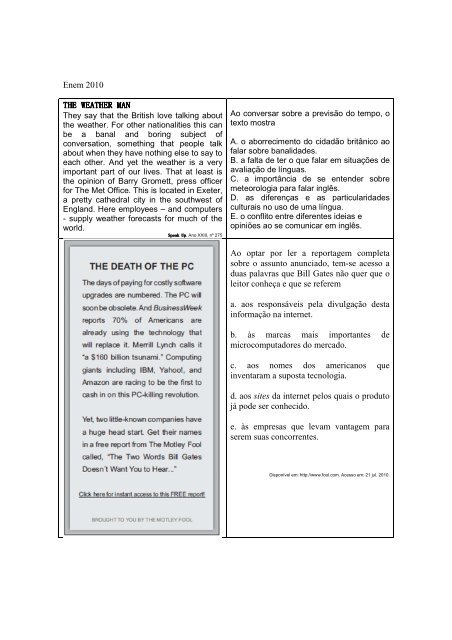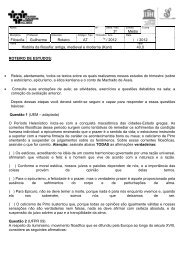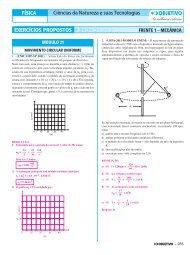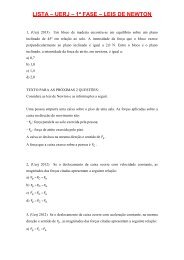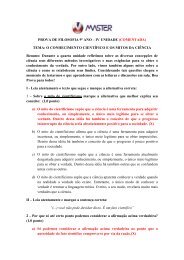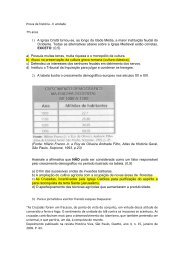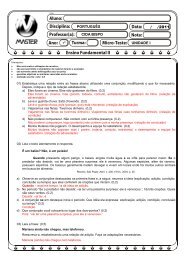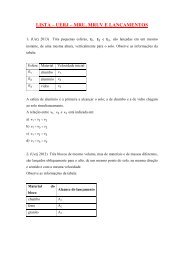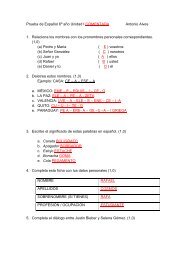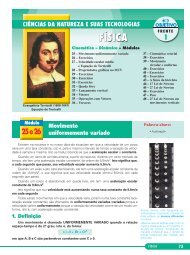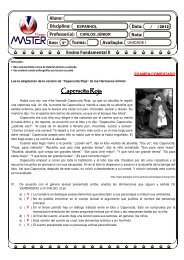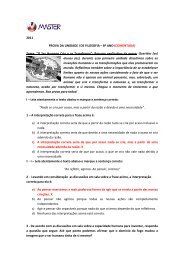Enem 2010 THE WEATHER MAN THE WEATHER MAN Ao optar ...
Enem 2010 THE WEATHER MAN THE WEATHER MAN Ao optar ...
Enem 2010 THE WEATHER MAN THE WEATHER MAN Ao optar ...
Create successful ePaper yourself
Turn your PDF publications into a flip-book with our unique Google optimized e-Paper software.
<strong>Enem</strong> <strong>2010</strong><br />
<strong>THE</strong> WEA<strong>THE</strong>R <strong>MAN</strong><br />
They say that the British love talking about<br />
the weather. For other nationalities this can<br />
be a banal and boring subject of<br />
conversation, something that people talk<br />
about when they have nothing else to say to<br />
each other. And yet the weather is a very<br />
important part of our lives. That at least is<br />
the opinion of Barry Gromett, press officer<br />
for The Met Office. This is located in Exeter,<br />
a pretty cathedral city in the southwest of<br />
England. Here employees – and computers<br />
- supply weather forecasts for much of the<br />
world.<br />
Speak Up. Ano XXIII, nº 275<br />
<strong>Ao</strong> conversar sobre a previsão do tempo, o<br />
texto mostra<br />
A. o aborrecimento do cidadão britânico ao<br />
falar sobre banalidades.<br />
B. a falta de ter o que falar em situações de<br />
avaliação de línguas.<br />
C. a importância de se entender sobre<br />
meteorologia para falar inglês.<br />
D. as diferenças e as particularidades<br />
culturais no uso de uma língua.<br />
E. o conflito entre diferentes ideias e<br />
opiniões ao se comunicar em inglês.<br />
<strong>Ao</strong> <strong>optar</strong> por ler a reportagem completa<br />
sobre o assunto anunciado, tem-se acesso a<br />
duas palavras que Bill Gates não quer que o<br />
leitor conheça e que se referem<br />
a. aos responsáveis pela divulgação desta<br />
informação na internet.<br />
b. às marcas mais importantes de<br />
microcomputadores do mercado.<br />
c. aos nomes dos americanos que<br />
inventaram a suposta tecnologia.<br />
d. aos sites da internet pelos quais o produto<br />
já pode ser conhecido.<br />
e. às empresas que levam vantagem para<br />
serem suas concorrentes.<br />
Disponível em: http://www.fool.com. Acesso em: 21 jul. <strong>2010</strong>.
Letras de músicas abordam<br />
temas que, de certa forma,<br />
podem ser reforçados pela<br />
repetição de trechos ou<br />
palavras. O fragmento da<br />
canção Viva la vida, por<br />
exemplo, permite conhecer o<br />
relato de alguém que<br />
A. costumava ter o mundo<br />
aos seus pés e, de repente, se<br />
viu sem nada.<br />
B. almeja o título de rei e, por<br />
ele, tem enfrentado inúmeros<br />
inimigos.<br />
C. causa pouco temor a seus<br />
inimigos, embora tenha muito<br />
poder.<br />
D. limpava as ruas e, com seu<br />
esforço, tornou-se de seu<br />
povo.<br />
E. tinha a chave para todos os<br />
castelos nos quais desejava<br />
morar.
<strong>Enem</strong><strong>2010</strong> (2ª aplicação)<br />
The six-year molars<br />
The six-year molars are the first permanent<br />
teeth. They are the “keystone” of the dental<br />
arch. They are also extremely susceptible to<br />
decay. Parents have to understand that these<br />
teeth are very important. Over 25% of 6 to 7<br />
year old children have beginning cavities in one<br />
of the molars.<br />
The early loss of one of these molars causes<br />
serious problems in childhood and adult life. It is<br />
never easy for parents to make kids take care of<br />
their teeth. Even so, parents have to insist and<br />
never give up.<br />
Módulo do Ensino Integrado: Fundamental,<br />
médio, Profissional – DCL<br />
O texto aborda uma temática inerente ao<br />
processo de desenvolvimento do ser humano, a<br />
dentição.<br />
Há informação quantificada na mensagem<br />
quando se diz que as cáries dos dentes<br />
mencionados<br />
A acontecem em mais de 25% das crianças<br />
entre seis e sete anos.<br />
B ocorrem em menos de 25% das crianças<br />
entre seis e sete anos.<br />
C surgem em uma pequena minoria das<br />
crianças.<br />
D começam em crianças acima dos 7 anos.<br />
E podem levar dezenas de anos para ocorrer.<br />
The record industry<br />
The record industry is undoubtedly in crisis, with labels laying off employees in continuation. This is<br />
because CD sales are plummeting as youngsters prefer to download their music from the Internet,<br />
usually free of charge.<br />
And yet it´s not all gloom and doom. Some labels are in fact thriving. Putumayo World Music, for<br />
example, is growing, thanks to its catalogue of ethnic compilation albums, featuring work by largely<br />
unknown artists from around the planet.<br />
Putumayo, which takes its name from a valley in Colombia, was founded in New York in 1993. It<br />
began life as an alternative clothing company, but soon decided to concentrate on music. Indeed its<br />
growth appears to have coincided with that of world music as a genre.<br />
Speak Up. Ano XXIII, nº 275 (fragmento).
A indústria fonográfica passou por várias mudanças no século XX e, como consequência, as<br />
empresas enfrentaram crises. Entre as causas, o texto da revista Speak Up aponta<br />
A o baixo interesse dos jovens por alguns gêneros musicais.<br />
B o acesso a músicas, geralmente sem custo, pela Internet.<br />
C a compilação de álbuns com diferentes estilos musicais.<br />
D a ausência de artistas populares entre as pessoas mais jovens.<br />
E o aumento do número de cantores desconhecidos.<br />
Crystal Ball<br />
Come see your life in my crystal glass –<br />
Twenty-five cents is all you pay.<br />
Let me look into your past –<br />
Here’s what you had for lunch today:<br />
Tuna salad and mashed potatoes,<br />
Collard greens pea soup and apple juice,<br />
Chocolate milk and lemon mousse.<br />
You admit I’ve got told it all?<br />
Well, I know it, I confess,<br />
Not by looking, in my ball,<br />
But just by looking at your dress.<br />
A curiosidade a respeito do futuro pode exercer<br />
um fascínio peculiar sobre algumas pessoas, a<br />
ponto de colocá-las em situações inusitadas. Na<br />
letra da música Crystal Ball, essa situação fica<br />
evidente quando é revelado à pessoa que ela<br />
A recebeu uma boa notícia.<br />
B ganhou um colar de pedras.<br />
C se sujou durante o almoço.<br />
D comprou vestidos novos.<br />
E encontrou uma moeda.<br />
SILVERSTEIN, S. Falling up. New York: Harper Collins Publishers, 1996.<br />
Hip hop music<br />
Hip hop music is a musical genre which<br />
developed as part of hip hop culture, and is<br />
defined by key stylistic elements such as<br />
rapping, DJing, sampling (or synthesis),<br />
scratching and beatboxing. Hip hop began in the<br />
South Bronx of New York City in the 1970s. The<br />
term rap is often used synonymously with hip<br />
hop, but hip hop denotes the practices of an<br />
entire subculture.<br />
Disponível em: http://en.wikipedia.org. Acesso em: 8 jul. <strong>2010</strong>.<br />
Brazilian hip hop is one of the world’s major hip<br />
hop scenes, with active rap, break dance, and<br />
graffiti scenes, especially in São Paulo, where<br />
groups tend to have a more international style,<br />
influenced by old school hip hop and gangsta<br />
rap.<br />
Brazilian rap has served as a reflection of<br />
political, social, and racial issues plaguing the<br />
disenfranchised youth in the suburbs of São<br />
Paulo and Rio. The lyrical content, band names,<br />
and song names used by Brazilian hip hop<br />
artists often connote the socio-political issues<br />
surrounding their communities.<br />
Disponível em: http://en.wikipedia.org. Acesso em: 8 jul. <strong>2010</strong> (fragmento).<br />
Sendo a música uma das formas de<br />
manifestação cultural de um país, o rap<br />
brasileiro, a partir das informações do texto, tem<br />
sido caracterizado<br />
A pela influência internacional nos nomes de<br />
bandas e de músicas.<br />
B como instrumento de reflexão crítica do jovem<br />
da periferia.<br />
C pela irreverência dos cantores, adeptos e<br />
suas vestimentas.<br />
D como um gênero musical de menor prestígio<br />
na sociedade.<br />
E pela criatividade dos primeiros adeptos do<br />
gênero hip hop.
Os aparelhos eletrônicos contam com um<br />
número cada vez maior de recursos. O<br />
autor do desenho detalha os diferentes<br />
acessórios e características de um celular<br />
e, a julgar pela maneira como os<br />
descreve, ele<br />
A prefere os aparelhos celulares com flip,<br />
mecanismo que se dobra, estando as<br />
teclas protegidas contra eventuais danos.<br />
B apresenta uma opinião sarcástica com<br />
relação aos aparelhos celulares repletos<br />
de recursos adicionais.<br />
C escolhe seus aparelhos celulares<br />
conforme o tamanho das teclas, facilitando<br />
o manuseio.<br />
D acredita que o uso de aparelhos<br />
telefônicos portáteis seja essencial para<br />
que a comunicação se dê a qualquer<br />
instante.<br />
Fecilcam <strong>2010</strong><br />
E julga essencial a presença de editores<br />
de textos nos celulares, pois ele pode<br />
concluir seus trabalhos pendentes fora do<br />
escritório.
PasUem 1fase <strong>2010</strong><br />
The Cell Phone Dilemma<br />
According to a recent study, in 2000<br />
only 5% of 13-17 year-olds had cell<br />
phones whereas today, over 50% do. In<br />
fact, children under 10 years old often<br />
possess cell phones and the companies<br />
are making them specially designed for<br />
the young ones. Whether your child<br />
wants a cell phone or whether you think<br />
she might need one, you are probably<br />
having difficulty deciding what to do.<br />
There are pros and cons to kids having<br />
cell phones, and it is a personal choice<br />
for you as a parent to make. For most<br />
kids, owning a cell phone is a sign of<br />
maturity and a status symbol. For<br />
parents, it is a convenient way to monitor<br />
their children, especially if they are<br />
picking them up from school or extracurricular<br />
activities.<br />
If you feel you and your child could<br />
benefit from a cell phone, and it won’t be<br />
misused, it may be time to buy one.<br />
However, there are some important<br />
ground rules to set with kids before<br />
handing over a new one. Because most<br />
public schools have strict policies for cell<br />
phone use, it is important to follow some<br />
basic guidelines. Although some of them<br />
may seem obvious, it is important to spell<br />
them out for children and pre-teens<br />
receiving this type of communication<br />
device:<br />
a) remind them that cell phones shouldn’t<br />
be used during class, even if it is “just to<br />
text” someone;<br />
b) cell phone use should be limited to<br />
lunch,<br />
recess and for after school;<br />
c) a monthly limit of minutes and text<br />
messages (SMS) should be set as a way<br />
of teaching them responsibility;<br />
d) encourage them to practice respect<br />
and good cell phone etiquette such as<br />
turning it off when attending social<br />
functions and visiting hospitals.<br />
Adapted from <br />
and . [07/08/<strong>2010</strong>].
UEM <strong>2010</strong>
Gabarito do <strong>Enem</strong> <strong>2010</strong><br />
D E A C D<br />
Gabarito do <strong>Enem</strong> <strong>2010</strong> (2ª aplicação)<br />
A B B C B<br />
Gabarito Fecilcam <strong>2010</strong><br />
31 E 32 D 33 A 34 D 35 A 36 E 37 B 38 C 39 B 40 D<br />
41 B 42 C 43 D 44 C 45 D<br />
Gabarito Pas-Uem <strong>2010</strong> 1ª etapa<br />
05 (01-04) 12 (04-08) 21 (01-04-16) 17 (01-16)<br />
Gabarito Uem <strong>2010</strong><br />
13 (01-04-08) 18 (02-16) 10 (02-08) 24 (08-16) 07 (01-02-04)
GABARITO CURSINHO (ENGLISH)<br />
Unidade 01 Part I (01. C / 02. D) Unidade 02 Part I (01. E / 02. B / 03. E / 04. C)<br />
Unidade 03 Part I (01. A / 02. C /03. C) Unidade 04 Part I (01. B / 02. A)<br />
Unidade 1<br />
a) drinks<br />
b) do – open<br />
c) take<br />
d) don’t play<br />
e) line<br />
f) speaks<br />
g) drink<br />
h) opens<br />
i) causes<br />
j) live<br />
02 – B<br />
03 – D<br />
04 – A<br />
05 – D<br />
06 – D<br />
07 - D<br />
Unidade 2<br />
1. 1) wanted – prefered<br />
2) opened<br />
3) studied<br />
4) tried<br />
5) finished<br />
6) rained<br />
7) worked<br />
8) carried<br />
2. 1) came<br />
2) bought<br />
3) left<br />
4) ate<br />
5) went<br />
6) met<br />
7) were<br />
03.1) saw<br />
2) lived<br />
3) arrives<br />
4) play<br />
5) have-had<br />
04. D<br />
Unidade 3<br />
01. a) will throw<br />
b) are<br />
c) would tell<br />
d) will get<br />
e) can lend<br />
f) hadn’t<br />
g) needed<br />
h) will be<br />
02. E<br />
03. C<br />
04. E<br />
05. D<br />
06. E<br />
07. D<br />
08. A<br />
09. A<br />
Unidade 4<br />
a) showed – had done<br />
b) had gotten<br />
c) came – had already<br />
spoken<br />
d) bought – had seen<br />
e) had stolen – got<br />
f) left – had told<br />
02. a) had found<br />
b) had overflowed<br />
c) had left<br />
d) remembered<br />
e) had died<br />
03 – E<br />
04 – A<br />
05 – D<br />
06 - C


